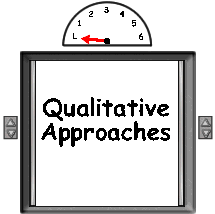





 |
|||||||||||||||
 |
 |
 |
|||||||||||||
|
|
|
|
|||||||||||||
|
|
|
|
|||||||||||||
|
|
|
||||||||||||||
 |
|
|
|||||||||||||
|
|
|
|
|||||||||||||
|
|
|||||||||||||||
|
|
|
 |
|||||||||||||
|
|
|
|
|||||||||||||
|
|
|
||||||||||||||
|
Week 8
(Page 2 of 3) |
|
|
|
|
| Library Lessons This Week |
This week our focus shifts to qualitative research. Similar to quantitative approaches, there are numerous approaches to conducting qualitative research. The three approaches that we will focus on in this course are grounded theory, ethnography, and narrative research. These qualitative designs represent the most common qualitative approaches. |
|
Lesson 1:
|
Qualitative Approaches There are many qualitative approaches including, but not limited to, grounded theory designs, ethnographic designs, and narrative research designs. These three designs represent the most well established qualitative approaches. To provide you with additional information on each of these approaches, I'd like to supplement your learning with other author's statements here. If you are interested in learning more about any of these designs or other research issues, feel free to browse through the reference room link above and explore the sites offered there. Lesson Activities
Need Help?: A sure bet to find a qualitative design is to look up ethnographies or social validation studies or focus groups. Often, research in the area of culture, ethnicity, and social class are good places to find qualitative research. Sometimes the authors will identify the qualitative nature of the study within the title, so you can even search by the term "qualitative" and find something. If you need additional help, seek assistance from the library. Call them, complete the remainder of the tutorials online, or go to the library and ask for assistance.
|
|
|
|
|
Lesson 2:
|
Fingerprinting Protocol This assignment has changed. In previous years, you were required to gain finger printing clearance to participate in our research courses. The responsiblity to check clearance has been moved to the individual district. If you are an employee of a school district and have access to students, then I recommend writing the proposal in research practicum in a way that will allow you to conduct the project on students that you already have access to through work. If you are not employeed or volunteering in a location that will provide access to research participants, start thinking of what you can do instead. Could you take up a volunteer position? Could you conduct a study where you do work, even it's not education related? How about conducting research on UWF students? In short, we want to make sure the children are kept safe and that all persons having contact with them have been cleared to work with children. If you are not employeed or cleared as a volunteer, be aware that you may have to undergo fingerprinting clearance with the district in which you intend to conduct your study. Again, this is up to them to impose at this point so there is nothing you need to submit to me at this time.
|
|
|
|
|
Lesson 3:
|
N/A
|
|
|
|
|
Contact the Library Staff
|
Need Help? Have a question but can't find the answer? Here are some options:
*Remember to include the course name and your name in your message. |
| To Page 1 | |
| Course Syllabus |
Course Schedule |
John C. Pace Library |
Course Resources |
Student Papers |
Course Home Page |
Updated on May 16, 2007 |
© 2004 by Leasha Barry. All rights reserved. |